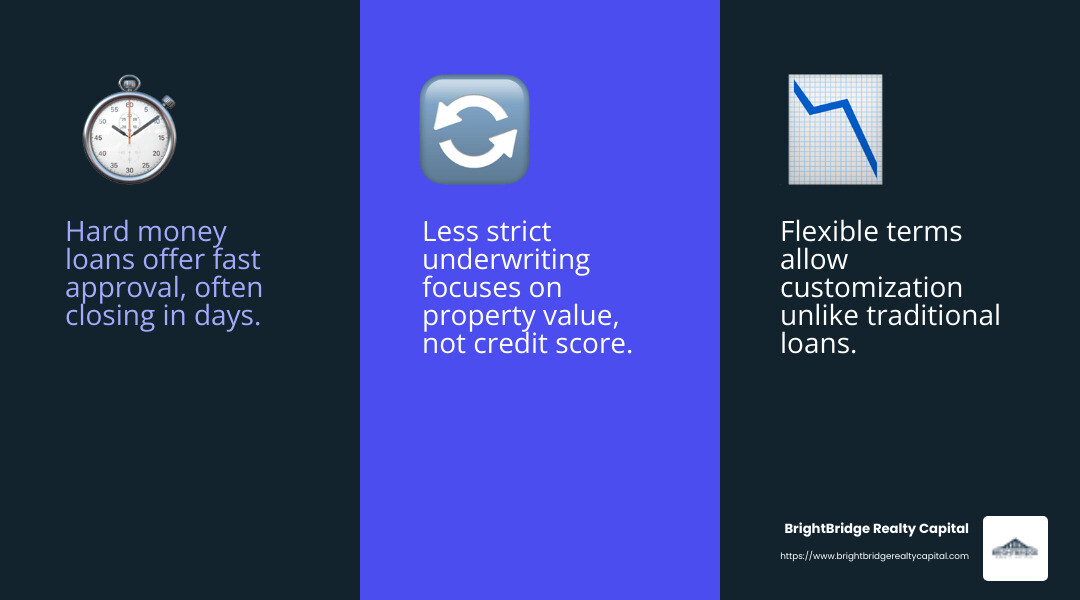Your Guide to Securing Hard Money Loans for Rental Investments

Hard money rental property loans can be a game-changer for real estate investors eager to expand their rental portfolios. These loans offer a swift, flexible financing solution that empowers investors to seize opportunities without the delays typical of conventional loans.
Why choose hard money loans for rental investments? Here's a quick look:
- Fast Approval: Speedy loan processing means you won't miss out on prime investment properties.
- Flexible Terms: Custom to your unique investment strategy, allowing greater control.
- Asset-Based Financing: Focuses on the property’s value rather than your credit score.
In the ever-competitive real estate market, securing the right funding quickly is crucial. Hard money loans provide the agility and custom terms that traditional mortgages often lack, making them an ideal option for both experienced flippers and those expanding rental portfolios.

Know your hard money rental property loans terms:
- hard money lenders for rental properties
- buying rental property with hard money
- getting a line of credit on a rental property
Understanding Hard Money Loans
Hard money loans are a unique type of financing that can be especially beneficial for real estate investors. These loans are typically short-term and are based on the value of the property rather than the borrower's creditworthiness. Let's break down what makes these loans tick.
Short-Term Financing
Unlike traditional loans, which may span 15 to 30 years, hard money loans are short-term. They usually last between 6 to 18 months. This short duration is perfect for investors who need to flip a property or quickly refinance once the property value increases. The goal is to pay off the loan quickly, often after improving the property and selling it for a profit.
Asset-Based Loans
One of the defining features of hard money loans is that they are asset-based. This means the loan is secured by the property itself. Lenders focus on the property's value, not your credit score or financial history. This opens the door for borrowers who might not qualify for traditional loans due to credit issues.

Property Value
The property value is crucial in determining the loan amount. Lenders often use a loan-to-value (LTV) ratio, which typically ranges from 70% to 80% of the property's appraised value. This means if a property is worth $100,000, you might secure a loan for $70,000 to $80,000.
This focus on property value makes it easier for investors to get financing, even if their personal finances aren't perfect. However, it also means that the property must have enough value to cover the loan, which can be a limiting factor in some cases.
In summary, hard money rental property loans offer a flexible and fast solution for investors. By focusing on short-term financing and the property's value, they provide access to capital that might otherwise be out of reach. This makes them a powerful tool for those looking to expand their rental portfolios or flip properties quickly.
Next, we'll explore the advantages of hard money rental property loans and how they can benefit your investment strategy.
Advantages of Hard Money Rental Property Loans
Hard money rental property loans offer several advantages that can make them an attractive option for real estate investors. Let's explore the key benefits.
Fast Approval
One of the biggest perks of hard money rental property loans is the speed of approval. Traditional loans can take weeks or even months to process, but hard money loans typically have a much faster turnaround. Since these loans are based on the property's value rather than the borrower's credit history, the approval process is streamlined. This can be a game-changer for investors who need to act quickly to secure a property or close a deal.
Flexible Terms
Hard money loans often come with more flexible terms compared to traditional financing. Lenders are private investors or companies that have the freedom to set their own rules. This means they can tailor the loan terms to fit the specific needs of the borrower. Whether it's adjusting the repayment schedule or negotiating interest rates, there's room for customization that you won't find with conventional loans.
Less Strict Underwriting
The underwriting process for hard money loans is generally less strict. Traditional lenders often require extensive documentation and have strict credit score requirements. In contrast, hard money lenders focus on the value of the property itself. This makes it easier for borrowers with less-than-perfect credit to secure a loan. The emphasis on the asset rather than the borrower’s financial history means fewer problems to jump through.

These advantages make hard money rental property loans a viable choice for investors looking to capitalize on real estate opportunities quickly and efficiently. With fast approval, flexible terms, and less stringent underwriting, these loans provide a practical solution for those who need swift access to capital.
Next, we'll explore how to secure hard money loans for rental investments.
How to Secure Hard Money Loans for Rental Investments
When it comes to securing hard money rental property loans, understanding the process can make all the difference. Let's break down the key steps you'll need to follow.
Property Evaluation
The first step in securing a hard money loan is evaluating the property you intend to invest in. Unlike traditional loans that focus on your credit score, hard money lenders are primarily interested in the property's value. They want to know the potential return on investment.
A thorough property evaluation includes assessing the property's current condition, market value, and potential for improvement. This evaluation is crucial because the loan amount you receive will be based on the property's value, not your financial history.
Lender Requirements
Each hard money lender will have its own set of requirements. It's essential to know what these are before you apply. Some lenders may require a minimum credit score, while others may not check your credit at all. Instead, they might focus on your experience as an investor or the potential profitability of the property.
Pro Tip: Reach out to the lender and ask for a list of their specific criteria. This will help you prepare the necessary documentation and increase your chances of approval.
Loan-to-Value Ratio
The loan-to-value (LTV) ratio is a critical factor in hard money lending. This ratio compares the loan amount to the appraised value of the property. Most hard money lenders offer loans with an LTV of 65% to 75%. However, this can vary based on the lender and the specifics of the deal.
A higher LTV means you can borrow more money relative to the property's value, but it also means more risk for the lender. To mitigate this risk, lenders may require you to provide a larger down payment or additional collateral.
Example: If a property is valued at $200,000 and the lender offers a 70% LTV, you could receive a loan of up to $140,000.
By understanding these elements—property evaluation, lender requirements, and loan-to-value ratio—you'll be better prepared to secure a hard money loan for your rental investment.
Next, we'll dig into the top considerations when choosing a hard money lender.
Top Considerations When Choosing a Hard Money Lender
Selecting the right hard money lender can significantly impact your investment success. Here are some key factors to consider:
Interest Rates
Interest rates for hard money rental property loans are usually higher than traditional loans. They typically range from 10% to 18%. This higher rate reflects the increased risk that lenders take when offering these loans. While a high rate might seem daunting, these loans are designed for short-term use.
Tip: Compare rates from different lenders to find the most competitive option. Even a small difference in interest rates can save you a lot of money over the life of the loan.
Fees
In addition to interest rates, be aware of the fees involved. Common fees include origination fees, which are generally 2% to 3% of the loan amount. There may also be fees for appraisals, underwriting, and early repayment penalties.
Checklist of Common Fees:
- Origination Fee: 2%-3% of loan amount
- Appraisal Fee
- Underwriting Fee
- Prepayment Penalty
Understanding these fees upfront can help you avoid surprises and budget effectively.
Loan Terms
Loan terms for hard money loans are typically short, ranging from three to 36 months. This short-term nature is ideal for quick projects like fix-and-flips or short-term rentals. However, it's crucial to have a clear exit strategy to repay the loan within this period.
Considerations for Loan Terms:
- Duration: 3 to 36 months
- Repayment Schedule: Monthly interest payments with a balloon payment at the end
- Prepayment Options: Check if there are penalties for early repayment
By carefully evaluating these factors—interest rates, fees, and loan terms—you can choose a hard money lender that aligns with your investment goals. This thoughtful selection process will help ensure that your hard money loan works in your favor.
Next, we'll address some frequently asked questions about hard money rental property loans.
Frequently Asked Questions about Hard Money Rental Property Loans
What are the typical terms for hard money loans?
Hard money loans come with short repayment periods, usually between 12 to 24 months. This is quite different from traditional loans that often span 15 to 30 years. The short timeline is designed to accommodate real estate investors who need to flip properties quickly or secure temporary financing.
These loans also have high interest rates, typically ranging from 10% to 18%. The liftd rates reflect the higher risk taken on by lenders. Despite the high rates, many investors find the quick access to funds and flexible terms worth the cost.
Do hard money lenders require appraisals?
While not all hard money lenders require traditional appraisals, they will conduct a property evaluation. This evaluation helps the lender assess the property's value and potential as collateral. Lenders might use their own methods or hire independent evaluators, focusing on the property's current condition and potential after repairs.
This lender assessment is crucial because hard money loans are primarily asset-based. The property's value is more important than the borrower's credit score or financial history.
How fast can you get a hard money loan?
One of the biggest advantages of hard money loans is their quick approval process. Unlike traditional bank loans, which can take weeks or even months to approve, hard money loans can be approved in as little as a few days. This speed is ideal for investors who need to act fast in competitive real estate markets.
After approval, fast funding is another benefit. Funds are typically available within a week or two, allowing investors to seize opportunities that require immediate action. This rapid access to capital is a key reason why many real estate investors opt for hard money loans over traditional financing options.
Conclusion
In real estate investing, hard money rental property loans offer a unique and powerful solution for those looking to secure quick and flexible financing. At BrightBridge Realty Capital, we specialize in providing customized financing solutions that cater to the diverse needs of real estate investors across the nation.
Our approach is centered on offering fast closings, often within a week, allowing investors to capitalize on opportunities without delay. By cutting out intermediaries, we deliver competitive rates and a seamless process, ensuring that your investment journey is as smooth as possible.
Whether you're flipping properties, building from the ground up, or expanding your rental portfolio, our team is dedicated to supporting your goals with custom loan options. Our expertise in the industry and commitment to customer service make us a trusted partner for investors.
Ready to take the next step in your real estate investment journey? Explore our customized financing solutions and find how we can help you achieve your investment goals with confidence.


